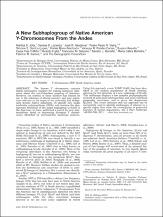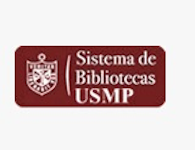A New Subhaplogroup of Native American Y-Chromosomes from the Andes

View/Open
Trabajo
(application/pdf: 284.7Kb)
(application/pdf: 284.7Kb)
Date
2011-12Author(s)
Jota, Marilza S.
Lacerda, Daniela R.
Sandoval Sandoval, José Raul
Vieira, Pedro Paulo R.
Santos-Lopes, Simone S.
Bisso-Machado, Rafael
Paixao-Cortes, Vanessa R.
Revollo, Susana
Paz-y-Miño, César
Fujita, Ricardo
Salzano, Francisco M.
Bonatto, Sandro L.
Bortolini, Maria Cátira
Santos, Fabrício R.
Metadata
Show full item recordAbstract
El cromosoma Y humano contiene marcadores altamente informativos para hacer inferencias históricas sobre el poblamiento precolombino de América. Sin embargo, la escasez de estos marcadores ha limitado su uso en la inferencia de ascendencia compartida y las migraciones pasadas pertinentes al origen de las diversidades cultural y biológica nativos americanos. Para identificar nuevos polimorfismos de nucleótido único (SNP) y aumentar la resolución filogenética del haplogrupo Q importante encontrado en las Américas, hemos realizado una búsqueda de nuevos polimorfismos basados en la secuenciación de los cromosomas Y divergentes identificados por análisis de haplotipos de microsatélites. Con este enfoque, un nuevo Y-SNP (SA01) ha sido identificado en las poblaciones andinas de América del Sur, lo que permite la detección de una nueva sublinaje de Q1a3a. Este sublinaje muestra una red filogeográfico menos complejo de microsatélites asociados y presencia geográfica más restringida, y se le da la designación Q1a3a4. Este resultado indica que nuestro enfoque puede ser utilizado con éxito para identificar sublinajes de interés en una región específica, que permiten la investigación de historias particulares de las poblaciones humanas. The human Y chromosome contains
highly informative markers for making historical inferences
about the pre-Columbian peopling of Americas.
However, the scarcity of these markers has limited its
use in the inference of shared ancestry and past migrations
relevant to the origin of the culturally and biologically
diverse Native Americans. To identify new single
nucleotide polymorphisms (SNPs) and increase the phylogenetic
resolution of the major haplogroup Q found in
the Americas, we have performed a search for new polymorphisms
based on sequencing divergent Y chromosomes
identified by microsatellite haplotype analysis.
Using this approach, a new Y-SNP (SA01) has been identified
in the Andean populations of South America,
allowing for the detection of a new sublineage of Q1a3a.
This sublineage displays a less complex phylogeographic
network of associated microsatellites and more restricted
geographic occurrence, and is given the designation
Q1a3a4. This result indicates that our approach can be
successfully used to identify sublineages of interest in a
specific region that allow the investigation of particular
histories of human populations.
Collections
- Artículos [274]
Publisher
American Journal of Physical Anthropology
Rights
info:eu-repo/semantics/openAccess







